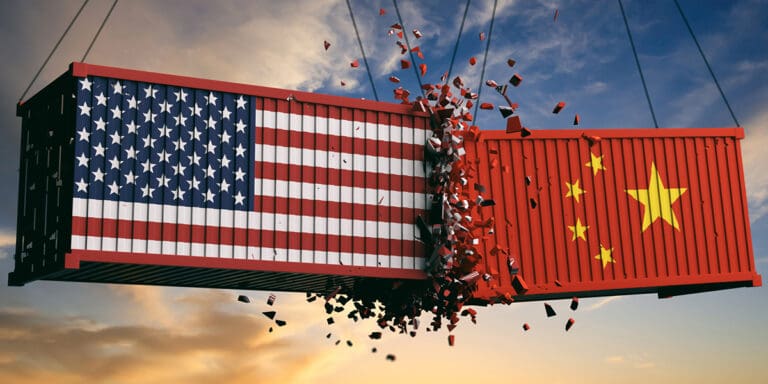Crypto News: Market Update March 2025
In March 2025, economic developments in the United States dominated the news, with former President Donald Trump’s trade policy and its effects on inflation, corporate earnings, and financial markets taking center stage. From a false announcement about a strategic crypto reserve to rising import tariffs and their impact on inflation and interest rates, it became clear how uncertainty and trade conflicts continue to affect the U.S. economy.
“Trump Establishes Strategic Crypto Reserve with Bitcoin, Ethereum, Solana, and XRP” – But Report Turns Out to Be Fake
On March 2, President Donald Trump announced via a post on Truth Social the creation of a “strategic crypto reserve” for the United States, including bitcoin, ether, XRP, Solana (SOL), and Cardano (ADA). The announcement triggered a strong rally in the crypto market: XRP surged by 33%, Solana by 25%, and ADA by more than 60%. Bitcoin and ether posted gains of 10% and 13%, respectively.
Trump stated that this crypto reserve would make the U.S. the “Crypto Capital of the World” and was intended to put an end to what he called “years of corrupt attacks” under the Biden administration. The plan was presented as part of a broader strategy ahead of a planned Crypto Summit at the White House.
However, it later turned out that the report was false. The Truth Social account that shared the news was not officially verified, and the so-called announcement was not confirmed by the White House or any other reliable sources. It became clear that it was a fake report, possibly intended to manipulate cryptocurrency prices.
Within the crypto community, the incident sparked outrage and discussions about the vulnerability of markets to rumors and misinformation. The price gains of many tokens were later partially reversed. (Source: CNBC)
March 12: Consumer Inflation in the U.S. Slows in February, but Higher Import Tariffs Put Upward Pressure on Prices
U.S. consumer inflation rose by 0.2% in February, the smallest monthly increase since October, bringing the annual rate to 2.8%. Lower airfare and gasoline prices partially offset higher costs for housing and food, such as the sharply rising egg prices due to avian flu.
As a result, the Federal Reserve has room to keep interest rates unchanged for the time being, but the import tariffs introduced by Trump on China, Canada, and Mexico are raising costs and threaten to accelerate inflation over the longer term. Core inflation, excluding food and energy, rose by 0.2% and stood at 3.1% year-over-year — the lowest level since April 2021. The trade conflicts are creating uncertainty around the inflation outlook and monetary policy, while consumers may accelerate purchases out of fear of further price increases. (Source: Reuters)
March 13: U.S. Treasury Yield Drops After Inflation Data and New Tariff Threat from Trump
U.S. Treasury yields fell on Thursday after the producer price index remained unchanged in February, while economists had expected a 0.3% increase. This follows a lower-than-expected rise in consumer prices, which appears to ease concerns about inflation and economic growth. However, investors remain uncertain about the Federal Reserve’s interest rate policy, which seems to be on hold for now. At the same time, the trade war escalated when President Trump threatened a 200% tariff on alcoholic products from the EU in retaliation for EU levies on whiskey. The U.S. Treasury Secretary emphasized that the government is focused on the long term and is not concerned about short-term volatility. (Source: CNBC)
March 19: Fed Holds Rates Steady Amid Trump’s Tariff Chaos
On Wednesday, the Federal Reserve kept interest rates unchanged as it awaited the impact of former President Trump’s economic measures. The Fed wants to see whether inflation moves toward their 2% target or if the economy weakens faster than expected before considering rate cuts.
Federal Reserve Chair Jerome Powell acknowledged the significant uncertainty surrounding trade conflicts, immigration crackdowns, and other Trump-era policies, which can both fuel inflation and slow growth. Although the labor market remains strong with a low unemployment rate of 4.1%, expectations for economic growth and inflation have become more negative.
Powell pointed out that it is still unclear how the “net” effects of Trump’s policies will play out and emphasized that consumers and businesses remain cautious with spending and investments. Despite growing pessimism among Americans, he said long-term inflation expectations remain largely anchored.
The Fed therefore remains cautious and is keeping interest rates stable for the time being to better assess the impact of recent policy changes. (Source: CNN)
March 27: U.S. Corporate Earnings Reach Record High Before Implementation of Trump’s Tariffs
In the fourth quarter, U.S. corporate earnings reached a record high of $4 trillion thanks to strong demand and pricing power. Although the economy grew at a slightly faster pace than previously thought, uncertainty caused by Trump’s import tariffs is creating a challenging environment for businesses. This could lead to layoffs to protect profit margins. Consumers made advance purchases to avoid rising prices, temporarily supporting growth. Despite strong profitability, companies remain cautious about hiring new staff due to economic uncertainty and potential retaliations from trade partners. Economists warn that the chance of a recession within 12 months is around 40%. (Source: Reuters)
March 28: Core Inflation in February Rises to 2.8%, Higher Than Expected
Core inflation in the U.S. rose by 0.4% in February, bringing the annual total to 2.8%, slightly higher than forecasts. This measures personal consumption expenditures excluding food and energy and is seen as an important indicator of long-term inflation. Consumer spending increased by 0.4%, slightly less than expected, while personal income rose more than predicted, by 0.8%. The Federal Reserve is closely monitoring these figures, especially due to the impact of Trump’s import tariffs, which could fuel inflation. Although inflation came in higher, the Fed is not expected to implement rate cuts for the time being. Households are proving more cautious and saving more, indicating restraint in consumption. (Source: CNBC)
Conclusion
Despite record profits among U.S. companies and a moderate rise in inflation, uncertainty surrounding Trump’s import tariffs is causing caution among businesses and consumers. The Federal Reserve has chosen to keep interest rates stable for now, while the market remains tense about the potential economic consequences of the trade policy and the increasing risk of a recession. The overall picture is one of a fragile balance between growth, inflation, and geopolitical tensions.



